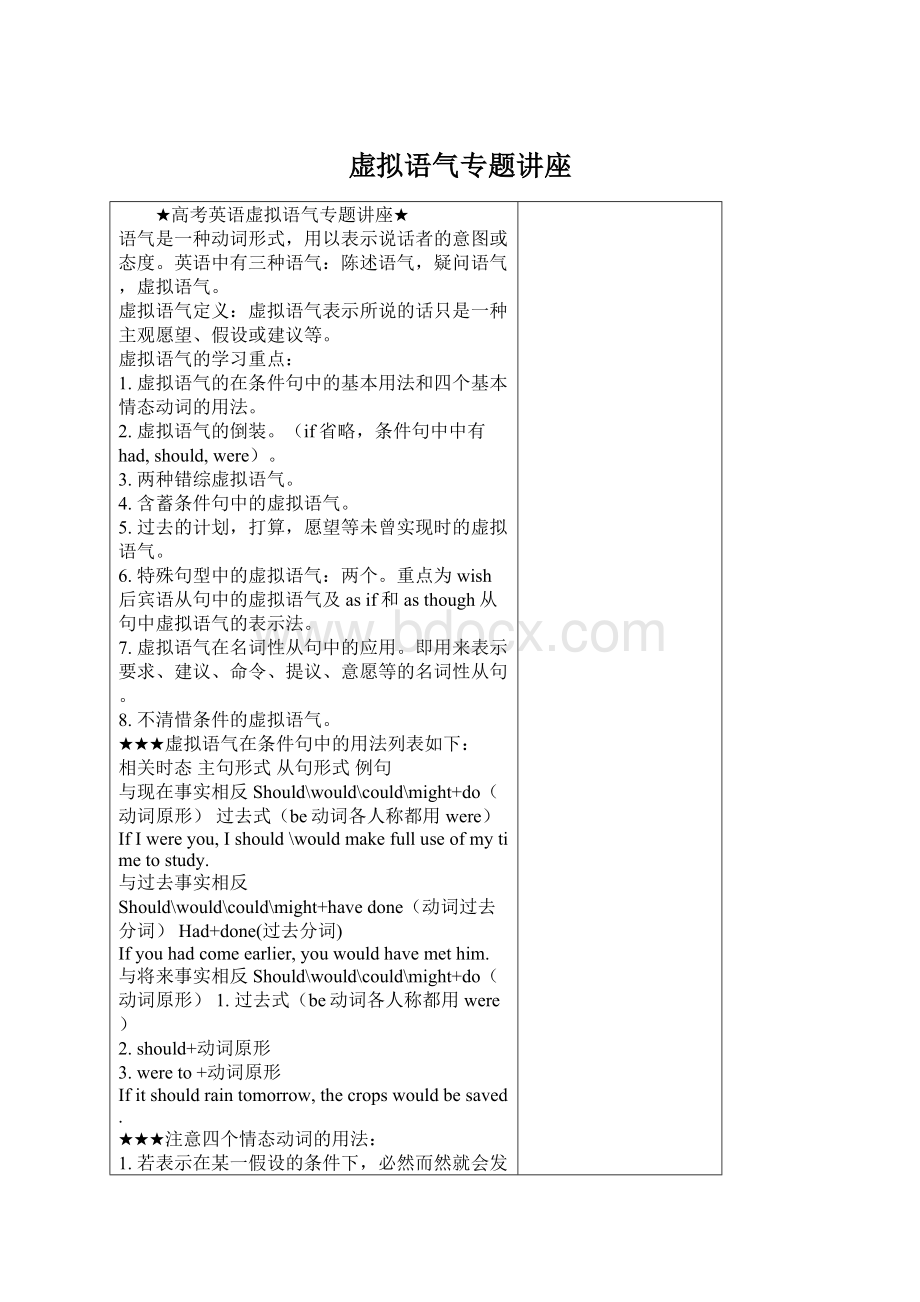虚拟语气专题讲座.docx
《虚拟语气专题讲座.docx》由会员分享,可在线阅读,更多相关《虚拟语气专题讲座.docx(12页珍藏版)》请在冰豆网上搜索。

虚拟语气专题讲座
★高考英语虚拟语气专题讲座★
语气是一种动词形式,用以表示说话者的意图或态度。
英语中有三种语气:
陈述语气,疑问语气,虚拟语气。
虚拟语气定义:
虚拟语气表示所说的话只是一种主观愿望、假设或建议等。
虚拟语气的学习重点:
1.虚拟语气的在条件句中的基本用法和四个基本情态动词的用法。
2.虚拟语气的倒装。
(if省略,条件句中中有had, should, were)。
3.两种错综虚拟语气。
4.含蓄条件句中的虚拟语气。
5.过去的计划,打算,愿望等未曾实现时的虚拟语气。
6.特殊句型中的虚拟语气:
两个。
重点为wish后宾语从句中的虚拟语气及as if和as though从句中虚拟语气的表示法。
7.虚拟语气在名词性从句中的应用。
即用来表示要求、建议、命令、提议、意愿等的名词性从句。
8.不清惜条件的虚拟语气。
★★★虚拟语气在条件句中的用法列表如下:
相关时态主句形式从句形式例句
与现在事实相反Should\would\could\might+do(动词原形)过去式(be动词各人称都用were)If I were you, I should \would make full use of my time to study.
与过去事实相反Should\would\could\might+have done(动词过去分词)Had+done(过去分词)If you had come earlier, you would have met him.
与将来事实相反Should\would\could\might+do(动词原形)1.过去式(be动词各人称都用were)
2.should+动词原形
3.were to +动词原形If it should rain tomorrow, the crops would be saved.
★★★注意四个情态动词的用法:
1. 若表示在某一假设的条件下,必然而然就会发生某事,第一人称可用should或would, 而二、三人称只用would.
2. 若表示在某一假设条件下就能够干某事,各人称都用could.
3. 如果表示在某种假设条件下有可能会发生某事,各人称都用might.
★★★虚拟语气倒装
请看典型考题:
__________ your address,I would have written to you.
A. Did I knowB. Were I to knowC. Had I known D. If I should know
此题应选 C。
这是虚拟语气的倒装形式。
当虚拟条件句中含有 were,had,should,could等动词时,可以将if省略,然后将 were,had,should,could 等词移至句首:
1. If he should fail,he would kill himself. →Should he fail,he would kill himself. 万一失败,他就会自杀。
2. If I were you,I would do it at once. →Were I you,I would do it at once. 假若我是你,我就会马上做。
3. If I could do it,I would. →Could I do it,I would. 要是我能做此事,我一定会做。
4. If he had seen you yesterday,he would haveasked you about it.
→Had he seen you yesterday,he would haveasked you about it. 他昨天要是看到了你,他就会问你这事了。
注意:
顺便说一句,以上移至句首的 had不一定是助动词,如果是实义动词也可倒装:
2楼
5. If he had money,he would buy a car. Had he money,he would buy a car. 他要是有钱,他就会买一辆小车。
将下列倒装句恢复正常:
a. Were it not for the fact that you are ill, I would give you a good beating.
要不是因为你有病这一事实,我就会狠揍你一顿。
b. Had he asked me, I would have given him my advice.要是他请求我的话,我就会给他建议的。
c. Were it to snow tomorrow, the hunter would not go hunting.万一明天下雪,猎人就不去打猎了。
★★★错综虚拟语气
How I wish I had studied harder when I was in school!
If you had, you ____ work into late every day nowadays.
A. don’t B. wouldn’t C. didn’t D. won’t
[解析]“要是我在校时能够更加努力地学习,那该多好啊!
”“要是你当时努力学习的话,你现在就不会每天都工作那么晚了。
”根据句意,条件与过去事实相反,而主句与现在事实相反。
常见的两种错综虚拟语气:
1.从句与过去事实相反相成,而主句与现在事实相反。
例如:
If you had not been strict with me when I was young, I could not be such a successful person now.如果我年轻时你没有对我严格要求的话,我现在就不可能是这么成功的一个人。
(这种虚拟语气的特点是主句中常含有时间准状语now 或nowadays)
2. Should anyone come and ask for me, tell them I will come back tomorrow.万一有人来找我,告诉他们我明天回来。
(主句为祈使句,条件句与将来事实相反,表示说话人认为某件事情发生的可能性很小。
)
★★★含蓄虚拟条件句
含蓄虚拟条件句是指句中没有明显的虚拟条件句,而是利用其他手段来暗示存在虚拟条件。
这类用法主要见于以下七种方式:
1. 将条件隐含在不定式短语中。
I should be happy to go with you. 如果能与你一起去,我将很高兴。
(=I should be happy if I could go with you.)
To have studied harder, you would have passed the examination. 你学习更用功些,你早就考及格了。
(=if you have studied harder, you…)
2. 将条件隐含在分词短语中。
Born in better times, he would have been a scholar. 如果出生在好时代,他早就成为学者了。
(=If he had been born in better times, he …)
Failing this time, what would you do?
假若这次失败,那你怎么办?
(=If you failed this time, what…)
Walking alone in the dark, Mary would be terrified. 要一个人单独在黑暗中走,玛丽会感十分害怕。
(If Mary walked alone in the dark, she…)
3楼
3. 将条件隐含在介词短语中。
Without air, no one could live. 没有空气,人就不能活。
(=If there were no air, no one could live.)
But for his help, he would have failed. 要不是有他的帮助,他就会失败了。
(=If it hadn’t been for his help, he would have failed.)
常用的介词或介词短语,如but for, but that, without, in case of, under, under more favorable condition等。
4. 将条件隐含在名词短语中。
A true friend would not have betrayed me.
若是真正的朋友,就不会背弃我。
(=If he had been a true friend, he would…)
A few hours earlier, and you would have seen the famous writer.
要是你早来几个小时,你就见到这位著名的作家了。
(If you had come a few hours earlier, you…)
5. 将条件隐含在某些连词(如or, or else, otherwise等)中:
具体用法如下:
它们后的句子如果说的不是客观事实,它们前边的句子采用陈述语气,后边的句子采用虚拟语气。
○1 句子(一般现在时)+ or, or else, otherwise + 句子(谓语部分:
should\would\could\might等+ 动词原形)
○2 句子(一般过去时)+ or, or else, otherwise + 句子(谓语部分:
should\would\could\might等+ have done)
I didn’t know that he was a cheat, or else I wouldn’t have believed him.
我不知道他是个骗子,不然我也不会相信他了。
(or else=if I had known he was a cheat))
I’m really very busy, otherwise I would certainly go there with you.
我真的是太忙了,不然我就会同你一道去了。
(otherwise=if I were not so busy))
6. 将条件隐含在定语从句中。
Anyone who had seen that painting might have taken it for a photo.
凡是看过那画的人,都可能把它看成是照片。
(=If anyone had seen that painting…)
7. 将条件隐含在一定的上下文中。
Don’t bother to read all these papers. It would take too long.
不要费事看所有这些文件了,那会花太多时间。
(=…If you read all these papers, it would take too long)
常用来表示含蓄虚拟条件的手段连词如:
so that, unless, in case, supposing, lest, provided(倘若……),for fear that(惟恐) , on condition that, if only(要是……就好了)等。
(注:
lest, for fear that和in case引起的从句中谓语动词多用should+动词原形,但可以不用虚拟语气,而用动词的陈述语气形式。
)例如:
4楼
The foreig